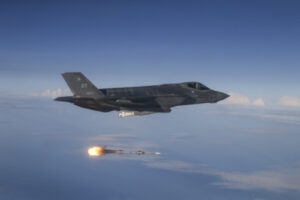Defense Daily International
-
 Uncategorized
UncategorizedExpanded Biometric Exit Tech Demonstrations To Begin In June
Customs and Border Protection (CBP) in June is slated to begin a robust round of technical demonstrations of its planned solution to better confirm the identities of travelers departing the […]
-
 Uncategorized
UncategorizedMore Tanks And Troops Needed To Face Off With Russia, NATO Commander Says
U.S. European Command needs more troops, especially armored units, in order to provide a credible deterrent to Russian heavy mechanized units it faces along NATO’s eastern flank, according to Supreme […]
-
DDI for Fri. April 28, 2017
- Raytheon Delivers Strong Earnings In First Quarter On Operating Performance
- NATO Reveals First Bids Under Tech Refresh
- Report: FireEye Says Chinese Hackers Attacking South Korea Over THAAD Deployment
- Australia And China Agree To Cooperate On Cyber Security
- Canada Requests $195 Million For C-17 Aircraft Sustainment Support
- NATO Extends Industry Cyber Coalition Further With RSA
- France Launches Construction Of Five Belharra-class Intermediate Frigates
- Trump Calls For Report On National Security Effects Of Aluminum Imports
- Crowdstrike Launches Latin America Operations
-
 Uncategorized
UncategorizedCrowdstrike Launches Latin America Operations
CrowdStrike announced April 25 it is launching an operation in Latin America to expand regional sales, marketing, and partner and business development support. This expansion includes a new office in […]
-
 Uncategorized
UncategorizedTrump Calls For Report On National Security Effects Of Aluminum Imports
President Donald Trump on April 27 called on his commerce secretary to determine the effects of aluminum imports on national security. In a presidential memorandum, the White House said core […]
-
 Uncategorized
UncategorizedFrance Launches Construction Of Five Belharra-class Intermediate Frigates
French Defence Minister Jean-Yves Le Drian officially launched the construction of five Belharra-class intermediate frigates (FTI), the Ministry said April 21. The frigate contract was originally awarded to the French […]
-
 Uncategorized
UncategorizedNATO Extends Industry Cyber Coalition Further With RSA
The NATO Communications and Information (NCI) Agency signed an Industry Partnership Agreement (IPA) on cyber information sharing with Dell subsidiary RSA Security on the margins of the NITEC17 conference, the agency said April 25. […]
-
 Uncategorized
UncategorizedCanada Requests $195 Million For C-17 Aircraft Sustainment Support
The State Department has approved a possible $195 million Foreign Military Sales request to Canada sustainment support for C-17 aircraft. The Defense Security Cooperation Agency (DSCA) notified Congress of the […]
-
 Uncategorized
UncategorizedAustralia And China Agree To Cooperate On Cyber Security
The Australian and Chinese governments agreed to enhance cyber security cooperation following discussions between leaders of the countries on April 21, the Australian Prime Minister’s office said April 24. Prime […]
-
 Uncategorized
UncategorizedReport: FireEye Says Chinese Hackers Attacking South Korea Over THAAD Deployment
FireEye [FEYE] found two cyber groups linked to China’s military and intelligence agencies have recently launched attacks on South Korea’s government after South Korea said it would deploy the THAAD […]
